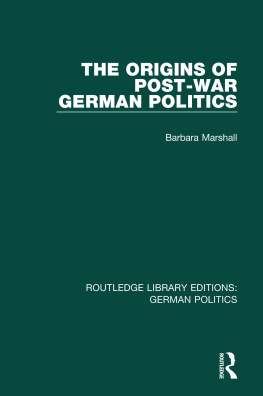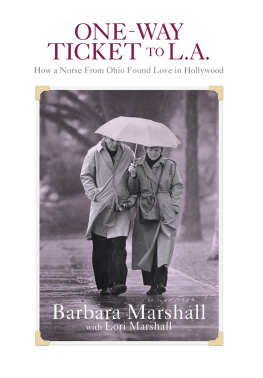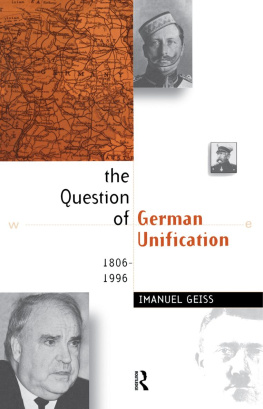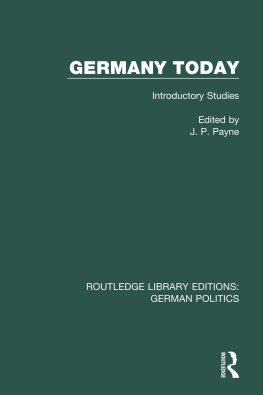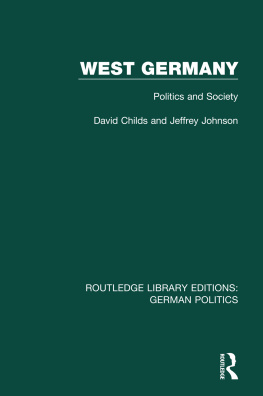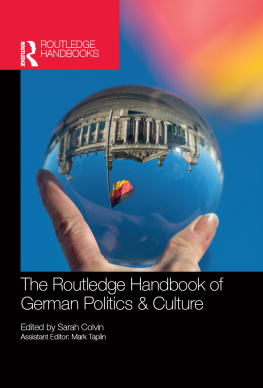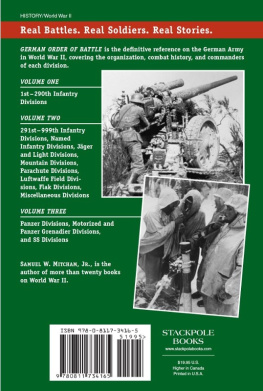ROUTLEDGE LIBRARY EDITIONS: GERMAN POLITICS
Volume 11
THE ORIGINS OF POST-WAR GERMAN POLITICS
The Origins of Post-War German Politics
Barbara Marshall
First published in 1988
This edition first published in 2015
by Routledge
2 Park Square, Milton Park, Abingdon, Oxon, OX14 4RN
and by Routledge
711 Third Avenue, New York, NY 10017
Routledge is an imprint of the Taylor & Francis Group, an informa business
1988 Barbara Marshall
All rights reserved. No part of this book may be reprinted or reproduced or utilised in any form or by any electronic, mechanical, or other means, now known or hereafter invented, including photocopying and recording, or in any information storage or retrieval system, without permission in writing from the publishers.
Trademark notice : Product or corporate names may be trademarks or registered trademarks, and are used only for identification and explanation without intent to infringe.
British Library Cataloguing in Publication Data
A catalogue record for this book is available from the British Library
ISBN: 978-1-138-83837-6 (Set)
eISBN: 978-1-315-72630-4 (Set)
ISBN: 978-1-138-83899-4 (Volume 11)
eISBN: 978-1-315-73367-8 (Volume 11)
Publisher's Note
The publisher has gone to great lengths to ensure the quality of this reprint but points out that some imperfections in the original copies may be apparent.
Disclaimer
The publisher has made every effort to trace copyright holders and would welcome correspondence from those they have been unable to trace.
The Origins of Post~War German Politics
Barbara Marshalll
CROOM HELM
London New York Sydney
1988 Barbara Marshall
Croom Helm Ltd, Provident House, Burrell Row, Beckenham, Kent, BR3 1AT
Croom Helm Australia, 44-50 Waterloo Road, North Ryde, 2113, New South Wales
Published in the USA by Croom Helm
in association with Methuen, Inc.
29 West 35th Street New York, NY 10001
British Library Cataloguing in Publication Data
Marshall, Barbara
The origins of post-war German politics.
1. Germany (West) Politics and government
I. Title
320.943 JN3971.A2
ISBN 0-7099-4690-2
Library of Congress Cataloging-in-Publication Data
ISBN 0-7099-4690-2
Contents
- ACC: Allied Control Council
- AsD: Archiv der Sozialen Demokratie. Bonn-Bad Godesberg
- CCG: Control Commission for Germany
- CCG (BE): Control Commission for Germany. British Element
- CCS: Combined Chiefs of Staff
- CDU: Christlich-Demokratische Union
- COGA: Control Office for Germany and Austria
- COSSAC: Chief of Staff, Supreme Allied Commands
- DGB Archiv: Archiv des Deutschen Gewerkschaftsbundes. Dsseldorf
- DP: Displaced Person
- FDP: Freie Demokratische Partei
- GU: General Union ('Einheitsgewerkschaft')
- HHN: Hannoversche Neueste Nachrichten
- HP: Hannoversche Presse
- IG Metall: Industriegewerkschaft Metall (Metal Workers Union)
- JCH: Journal of Contemporary History
- K Det.: Military Government Detachment for an urban district
- KPD: Kommunistische Partei Deutschlands
- MG/Mil.Gov.: Military Government
- NB: Nachlass Bratke (Bratke Papers)
- NHK: Neuer Hannoverscher Kurier
- NLP: Niederschsische Landespartei
- L/R Det.: Military Government Detachment for a region
- OB: Oberbrger meister
- OP: Oberpresident
- OV: Ortsverein (Local Party Branch)
- P/Det.: Military Government Detachment for a province
- PRO/FO: Public Record Office, Foreign Office files
- PRO/WO: Public Record Office/War Office files
- RC: Reconstruction Committee
- Rpr: Regierungspresident
- SAH: Stadtarchiv (Town Archive) Hanover
- SCAEF: Supreme Commander Allied Expeditionary Force
- SHAEF: Supreme Headquarters Allied Expeditionary Force
- S Det.: Military Government Detachment for a town
- SPD: Sozialdemokratische Partei Deutschlands
- STAH: (Lower Saxonian) Staatsarchiv Hanover
The research for this book was carried out in Britain and during the course of a sabbatical year in 1980/81, in Germany. In Britain the files of the Foreign and War Office were most productive although those of the Control Commission were sadly disappointing as they contain mainly circulars and do not allow the kind of insight into the working of the Commission which could be expected. I was able to interview (Sir) Ashley Bramall (16.10.1984), formerly an Industrial Relations Officer with Military Government in Hanover and (Lord) Annan (25.4.1985) who, although not directly involved in local affairs, was nevertheless one of the few officers of Military Government with an overview of German political organisations, opinions and intentions.
In Germany I came up against the difficulties which most researchers into the immediate post-war period encounter: the scarcity of source material. The destruction and disruption at the end of the war, coupled with an acute paper shortage made the keeping of records a low priority. Nevertheless, for Hanover the situation was more favourable in that here, in the Town Archive, the papers of the former Oberbrgermeister Bratke are preserved, as well as those of a number of other officials and prominent citizens. In the Lower Saxonian State Archive the regional government files were most useful. In addition there were Schumacher's personal papers in the Archiv der Sozialen Demokratie in Bonn and those of the leading Hanoverian trade unionist, Albin Karl, in the Archiv des Deutschen Gewerkschaftsbundes in Dsseldorf.
Many other records remain however in private hands. Thus the papers of the SPD Ortsverein Hanover are held by the Politische Seminar of the university. Many Works Archives of the Hanover firms either refused access or keep their files closed. The former was the case of the firm Continental where I was unable to work; the latter that of the Sprengel sweets factory, the files of which are lodged with the State Archive. The Chamber of Industry and Commerce, Hanover, refused access to its files which 'are still in some disarray' (Letter to the author 12.1.1981). I was however able to use their printed material.
The availability of material naturally affected the emphases placed in this book. For instance I would have liked to include more on the economy and to have gone into greater detail over denazification. Files relating to denazification are closed to the public by a law passed in the Lower Saxonian Diet, 'Concerning the conclusion of Denazification in Lower Saxony' of 18.12.1951. There was also very little to base an analysis of 'bourgeois' politics on; official sources are virtually unobtainable. I was however able to interview Dr K Pentzlin, the former director of Bahlsen's biscuit factory and a leading figure in Hanover's pre- and post-war economy. Although of intrinsic interest and merit, and adding to the historian's general understanding of the period, this interview did not provide enough substantive information for a widening of the perspective of this book. Researching it has been an experience in itself. Many people were reluctant to talk about their experiences, and this applied to older Social Democrats almost as much as to 'bourgeois' personalities. The former by 1980/81 had come in for such massive criticism from younger 'left' historians for their failure to 'make a revolution' after 1945, that in many cases they were reluctant to allow me access. That this was possible was the result of the help of the director of the Stadtarchiv , Dr Mlynek. I was able to interview H Hasselbring, Schumacher's aid and secretary in the first post-war phase (4.3.1981) and A Holweg, Schumacher's successor as the chairman of the SPD Ortsverein Hanover after the latter had moved on beyond the local sphere in 1946 (11.5.1981).

